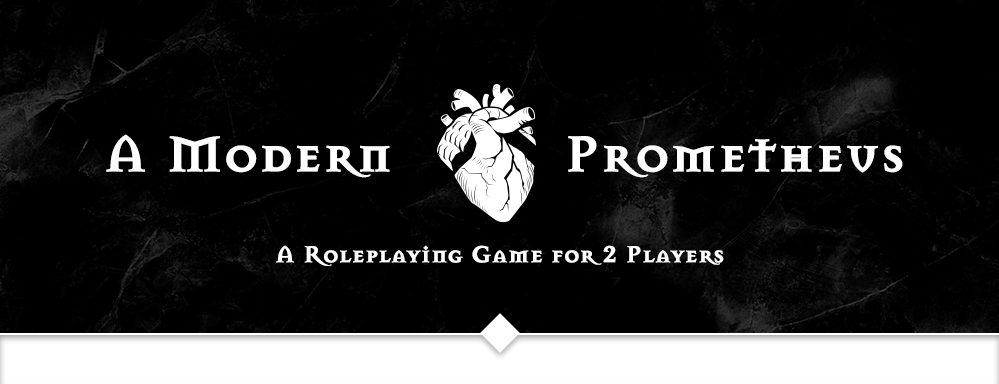Themes and Principles: How the Monsters are Made

Been a bit quiet with my content updates recently, so let’s change that. We’re still sitting at around 17% of the way to our first stretch goal, adding extra art throughout the book for all past and future copies. But plenty else has been happening!
I recently recorded a conversation with Marx Shepherd (@IAmPhophos | marx-shepherd.carrd.co) for the Yes Indie’d podcast (@YesIndiedPod | yesindiedpod.com) about A Modern Prometheus. The conversation was a huge amount of fun, and a pretty rambley (on my part) romp through some of my theory and practice in making A Modern Prometheus, and what’s so great about indie roleplaying games generally. I definitely recommend subscribing to Yes Indie’d, and look out for that episode in early December.
In other podcast news, Tucker Lemos and Arya Burke played A Modern Prometheus on the Scene Play podcast (@scene_play | sceneplay.fireside.fm). Their game was fantastic: it’s a really engaging, incredibly high-quality story that is genuinely gripping, shocking, and hilarious in turns. If you want an example of what A Modern Prometheus is like to play, subscribe to Scene Play and check out the episode.
But I wanted to use this update to talk through some of the design themes and principles that I used in the creation of A Modern Prometheus. These are different from (but related to) the Principles for players found on page 10 of the game book, these are the ideas that informed my design process as I was writing the game, designing minigames, and developing the rules and information text.
We Do Not Create Ourselves…
A Modern Prometheus is a game about discovering who the two main characters are. But what sets it apart from many games is that you generally have more control over describing the other player’s character than your own. When designing minigames, I was always thinking about what each game, and each prompt, tells us about the characters, and who has the power to make statements.
How this plays out in games like Creating Monsters is pretty obvious—the Scientist player is asked to describe the Creation, the Creation is not asked to describe themself, and vice versa. But two of my favourite other examples are The Masquerade and Seek Humanity.
In The Masquerade, the Creation player takes the role of a Socialite at a party, spreading gossip about the Scientist. These salacious rumours flesh out how society sees the Scientist, and allows the Creation player to prompt the Scientist player to think about how their character is seen by the world. These are rumours and gossip, they don’t have to be true in the game world, but the Scientist has the chance to choose if they are or not, and what that means for who they are.
In Seek Humanity, the Scientist player takes the role of an Innocent. This is the scene from the 1931 film version of Frankenstein where the creature, confused and unsure about how the world works, throws little Maria into a lake (which, just for trivia, isn’t a scene in Shelley’s original text). The Innocent poses questions of the Creation and makes judgements based on the Creation’s answers—is the Creation human, or a monster?
In both these games, players have a level of control over defining their opposite. Inside the world of the story, the characters are defined at first by their interactions with other characters and the world they live in.
…But We Choose Who We Are
Characters in A Modern Prometheus may be defined by circumstance and other characters, but at the end of the day they always get to choose who they are. The game asks players to hear how they are perceived, and to make decisions about that: am I truly the monster they see me as?
Both The Masquerade and Seek Humanity ask this question of the players. In The Masquerade, the Scientist is asked each time they hear a rumour about themselves, “Is this true?” Obviously they can lie to the fictional Socialite, but as a player they have to make a decision: is this horrible rumour about me true, or am I better than the gossip makes me out to be?
Seek Humanity’s decision is more stark. The Innocent makes a judgement: is the Creation human, or monster? The Creation is then asked to embrace one side of themselves—asked to choose, metaphorically, between befriending Maria or throwing her into the lake. They’re incentivised by the minigame to agree with the Innocent, but what happens when the Innocent sees you as a monster that you know you’re not?
This tension between how people see us and how we see ourselves—this question of who gets to decide if we’re monstrous—is the key conflict in a game of A Modern Prometheus.
Get A Modern Prometheus
A Modern Prometheus
A Roleplaying Game for 2 Players about Gothic Horror, Dark Science, and Creating Monsters
| Status | Released |
| Category | Physical game |
| Author | Games by Mitch |
| Genre | Role Playing |
| Tags | firebrands, frankenstein, Gothic, Horror, literature, Monsters, role-playing-game, Tabletop role-playing game |
More posts
- Minor layout updateSep 09, 2022
- Art Drop!Jul 01, 2021
- 30% Milestone, and Support Other Itchfunders!Apr 08, 2021
- 25% to Stretch Goal, New Art Coming, and Yes Indie'd Podcast!Jan 06, 2021
- A Modern Prometheus v1.0.1Nov 11, 2020
- One Week Down - 7% to Stretch GoalOct 23, 2020

Leave a comment
Log in with itch.io to leave a comment.